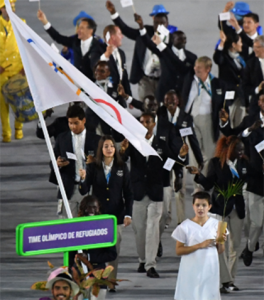Refugee Olympic Team wowing Tokyo
A Syrian swimmer who dived into the water to help steer a broken down refugee boat and runner who escaped conflict by crossing a dessert on foot.
These two unassuming athletes – Yusra Mardini and Tachlowini Gabriyesos – were the flag bearers of the Refugee Olympic Team competing in Tokyo.
 The 29 members of the team have all endured hardships fleeing from their homelands amid conflict or persecution, and faced difficulties adjusting to new cultures.
The 29 members of the team have all endured hardships fleeing from their homelands amid conflict or persecution, and faced difficulties adjusting to new cultures.
Overcoming all that this week, members of the team have made a proud entrance during the opening ceremony of the Tokyo 2020 Olympic Games, delayed by a year due the global pandemic.
The team members come from eleven countries, including Syria, South Sudan, Iran and Afghanistan.
They entered the Olympic stadium second behind Greece, which traditionally leads the parade of nations.
Swimmer Yusra Mardini, originally from Syria, and marathoner Tachlowini Gabriyesos, who fled Eritrea both held aloft a white flag emblazoned with the five Olympic rings representing the five continents — the flag under which they will compete.
Mr Gabriyesos, 23, fled fighting in Eritrea at age 12, making an extraordinary trek northwards across Sudan and Egypt, including crossing part of a desert on foot, to reach Israel, where he sought refugee status. He now lives and trains in Tel Aviv, where he runs with a local club.
In March, he ran in only his second official marathon, finishing in a fast time of 2:10:55, which is under the Olympic marathon qualifying time.
“Giving up isn’t me,” he said in an interview before the Games.
This will also be the second Olympics for swimmer Ms Mardini, also 23, who will compete in the 100 metres butterfly.
Originally from Damascus, she was a competitive swimmer who represented Syria in international meets. But as the conflict in her country worsened, she and her sister left in 2015 to try to get to Europe.
From Turkey, Mardini boarded a small boat for the 10-kilometre trip to a Greek island that was supposed to take 45 minutes. When the motor on the rubber dinghy, meant for six or seven people but carrying 20, broke, she and her sister were among those who got into the water and swam to lighten the load and bring the boat safely to shore.
Ms Mardini eventually made her way on foot and by bus to Berlin, Germany, where she now lives. Like other athletes, she said sport gave her life meaning and direction during her adjustment.
“I tell my story because I want people to understand that sport saved my life,” she said.
Now a UNHCR Goodwill Ambassador, one of her main messages is that refugees are normal people who have been forced to flee their homes due to circumstances outside their control.
“I think it’s a great opportunity to represent millions of refugees around the world, to represent that those people are normal and have dreams,” Ms Mardini said.
“I also want to remind everyone that refugees are still in the camps, and they really do need our help.”
For the first time at an Olympics, each team was led by both a male and female athlete.
Five years ago, in Rio de Janeiro, ten athletes from four nations made up the first Refugee Olympic Team.
The IOC created the team in partnership with UNHCR, the UN Refugee Agency, to raise awareness of the plight of refugees and send a message of hope to fellow refugees and to the world.
Normally, incoming athletes are greeted by the roar of the crowd, but due to COVID-19 countermeasures that mean spectators are unable to attend, this year the stadium was strangely quiet, turning the ceremony largely into a TV event watched by millions around the globe.
The UN High Commissioner for Refugees Filippo Grandi described watching the Refugee Olympic Team enter Tokyo’s Olympic Stadium as a moment of immense pride.
“To see these refugee athletes honoured and applauded on the Olympic stage was a significant moment for representation of the world’s more than 82 million displaced people, and a reminder to the world that, given the opportunity to pursue their dreams and passions, refugees are powerful contributors to society,” Mr Grandi said.
Nine of the athletes come from Syria, which has been plagued by conflict since 2011.
Five are from Iran, four from South Sudan and three from Afghanistan.
Other countries of origin include Eritrea, Iraq, the Republic of the Congo, the Democratic Republic of the Congo, Cameroon, Sudan and Venezuela.
See the UNHCR’s Olympic video here: https://www.unhcr.org/news/stories/2021/7/60faced14/refugee-athletes-stride-global-spotlight-tokyo-games-begin.html












